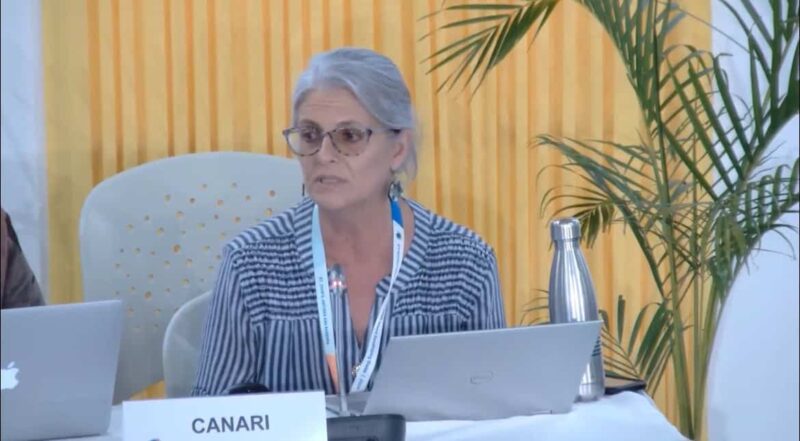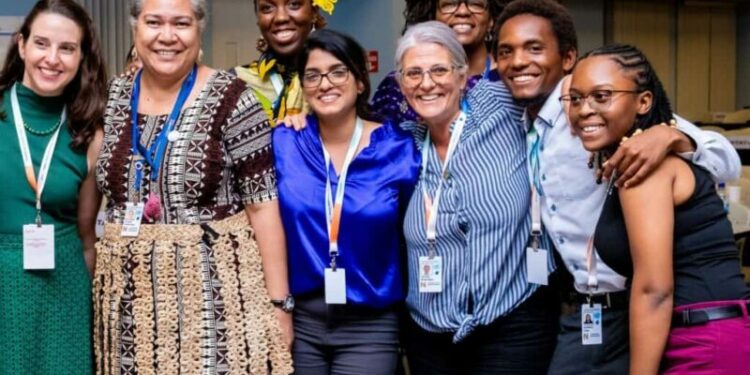Representatives of various civil society organisations which participated in the recent SIDS4 Conference Civil Society Forum in Antigua and Barbuda. Photo by CANARI, courtesy Cari-Bois Environmental News Network, used with permission.
By Stefanie Lauchman
This story was first published on the Cari-Bois Environmental News Network. An edited version appears below as part of a content-sharing agreement.
The fourth Small Island Developing States (SIDS4) Conference concluded nearly three months ago, on May 30 in Antigua and Barbuda. Ever since, stakeholders have been committed to their advocacy efforts with the hope of ensuring that SIDS remain classified as a “special case” for sustainable development, a designation they had earned in 1992, during that year’s UN Conference on Environment and Development in Rio de Janeiro, Brazil.
The classification recognised that while many emerging environmental threats like climate change may affect SIDS, the countries themselves weren’t inherently the driving forces behind such threats. As such, the designation also paved a pathway for developed countries to be held accountable for the role they play in the climate crisis and, in turn, take action to reduce the vulnerabilities and improve the resilience of SIDS.
Since that time, however, some “Global North” countries have been resistant to the point where SIDS now find themselves fighting a silent battle to safeguard their designation. Director of the Caribbean Natural Resources Institute (CANARI), Nicole Leotaud — who continuously highlighted the issue at this year’s SIDS4 Conference — said that “pushback” against the idea that SIDS do not need special assistance for their sustainable development is disappointing.

Director of the Caribbean Natural Resources Institute (CANARI), Nicole Leotaud, during the SIDS4 Conference in Antigua and Barbuda. Photo By Stefanie Lauchman, courtesy Cari-Bois Environmental News Network, used with permission.
She also noted that the vulnerabilities which led to the “special case” designation for SIDS – their geographic sizes and economies – are still important to consider, explaining, “We are not creating these problems but they’re tremendously disruptive to our development.” The most obvious issue, Leotaud continued, is climate change, where SIDS are not the major contributors to greenhouse gases: “However, SIDS are on the frontline, and we are one of the most vulnerable groups.”
While a 10-year plan of action entitled “The Antigua and Barbuda Agenda (ABAS) for SIDS” was endorsed at SIDS4, Leotaud maintained that Small Island Developing States like the Caribbean must still be provided support, even as they lead their own sustainable development agenda. Prior to the start of the conference, CANARI organised a pre-summit for civil society organisations to ensure they are effectively engaged in contributing to the actions outlined in the ABAS document.
Suriname’s Minister of Spatial Planning and Environment Marciano Dasai is outraged at the “resistance” SIDS are being faced with. He believes there is enough evidence to support the “special case” for sustainable development status — for Suriname and other small island territories. From extreme drought to devastating floods, Dasai said that the effects of climate change in Suriname have become more noticeable in recent times.
Suriname is the most forested country in the world and contributes significantly to the sequestration of carbon that has been emitted by Global North countries for centuries.
James Ellsmoor, founder and director of the global environmental consultancy and advisory firm Island Innovation, which has been assisting SIDS with sustainable development efforts for several years, said it is important for them to maintain their special status.
While some SIDS can be considered upper middle income, Ellsmoor maintained that they are uniquely vulnerable because of their small geographic size, as the entire Gross Domestic Product (GDP) of a country can be wiped out by a single weather event like a hurricane: “This fragility needs to be considered, as the realities of climate change for SIDS are very different and unique.”
Ellsmoor also cautioned that there are challenges with using GDP per capita as a measurement for development and accessibility, especially considering on-the-ground realities in Small Island Developing States. A large hotel development within a robust tourism industry, for example, can contribute to higher GDPs, but the revenue generated may not always be returned to the local economy and help citizens.
One of the encouraging outcomes of the SIDS4 Conference, however, was the way in which civil society organisations united in their advocacy. Throughout the conference, these groups — which emphasised their role in shaping policies and strengthening stakeholder collaboration to advance the sustainable development agenda — were committed to ensuring that their voices were heard, and their contributions regarding the needs of SIDS were taken into account.
While SIDS continue to demand that Global North countries take accountability for their role in the climate catastrophe we all face, it seems clear that pushback on the “special case” for sustainable development designation will continue. “Thankfully,” Ellsmoor said, “the SIDS4 Conference has seen a strong voice for advocacy for the special needs of SIDS.”
Source link : http://www.bing.com/news/apiclick.aspx?ref=FexRss&aid=&tid=66bdfa899a59466eaa6c31a9c5db45c3&url=https%3A%2F%2Fglobalvoices.org%2F2024%2F08%2F13%2Fafter-the-sid4-conference-in-antigua-barbuda-small-islands-fight-to-maintain-special-case-status-at-the-un%2F&c=8149345123136369344&mkt=en-us
Author :
Publish date : 2024-08-13 08:58:00
Copyright for syndicated content belongs to the linked Source.








